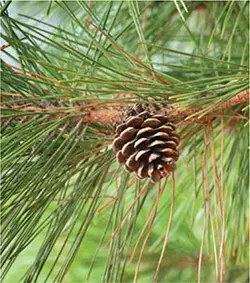
Origins of Pine
Pine essential oil is obtained from the needles of the Pinus sylvestris, commonly known as Scots pine. This coniferous tree is not only valued for ornamental purposes but also for its timber and resinous sap, which is utilized in making turpentine and pine tar. The oil is celebrated for its invigorating, woodsy aroma and its various therapeutic, medicinal, and household cleaning applications.
Historical Background and Lore
Originating from Europe and Asia, the pine tree gained popularity in the United States as a Christmas tree in the 1950s, despite climatic and soil challenges in certain regions. Native Americans historically chewed pine needles for their vitamin C content to prevent scurvy. Additionally, pine needles were used in stuffing mattresses to deter lice and fleas.
Therapeutic Uses of Pine Essential Oil
Health Benefits
Pine essential oil shares many properties with eucalyptus. It’s effective in massages or bathwater for soothing sore muscles and joints. As an inhalant, it addresses respiratory issues, acting as an expectorant to alleviate congestion. Moreover, pine oil serves as a stimulant, enhancing metabolism and boosting energy levels.
Personal and Spiritual Growth
Pine oil is known for its ability to clear the mind and ground the body. It harmonizes the heart and sacral chakras, promoting inner peace and self-love. Its potent scent uplifts the spirit while fostering acceptance and recognition of inner wisdom. Used in meditation, pine oil can dispel dark moods and sharpen spiritual focus.
